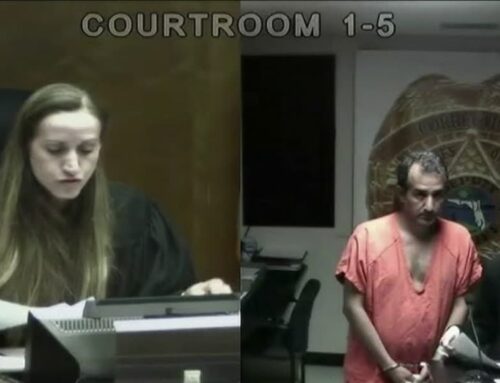Search Warrants in Florida
As a private citizen facing criminal charges in Florida, one of the most intrusive actions the government can take against your constitutional rights is to conduct a search, often done pursuant to a judge-approved search warrant. Understanding how search warrants work is key. This comprehensive post breaks down the search warrant process so you understand your rights and the proper procedures police should follow.
What is a Search Warrant?
A search warrant is a written order signed by a judge that allows police to enter a specific location to search for and seize evidence of a crime. The requirements and procedures for obtaining and executing a search warrant in Florida are governed by the U.S. Constitution (specifically the Fourth Amendment), Section 12 of the Florida Constitution, Florida Statutes Chapter 933, and extensive case law.
Requirements for a Valid Search Warrant
For a search warrant to be constitutionally valid in Florida, several essential requirements must be met:
Probable Cause
The Fourth Amendment of the U.S. Constitution unambiguously requires search warrants to be based on probable cause. This means the police must submit enough evidence to lead a reasonable, objective person (in this case, the judge reviewing the warrant application) to believe that criminal activity is likely taking place and that evidence related to that suspected crime will probably be found in the particular place law enforcement wants to search if they just had the chance to look.
Establishing probable cause is no mere formality. The stakes are high because a search warrant allowing police to enter, inspect, and seize private property against the owner’s will is a direct government intrusion into areas normally protected by an individual’s constitutional right to privacy. As such, the probable cause standard cannot be taken lightly.
Police usually try to establish probable cause by submitting to a judge or magistrate a detailed affidavit explaining why they have reason to believe specific evidence or contraband related to a specific crime is presently located in the specific place they want to search if only the court would permit them. Critically, probable cause cannot just be a bare, unsupported conclusion stated conclusively without any facts backing it up. That would give no basis for the judge to independently determine probable cause. Instead, probable cause requires the police affidavit to contain enough objective, specific factual information about the precise location to be searched and the observed criminal behaviors reasonably expected to have generated evidence police now want to legally seize for the judge to decide probable cause standards justifying a search warrant are objectively met based on the totality of unique circumstances presented in this specific case.
Description of Location and Items
In addition to solid probable cause, the warrant itself must also specifically describe the precise place to be searched and the exact items police legitimately expect to actually find there based on the probable cause facts asserted. An insufficiently detailed location or list of items to be seized raises the alarming specter of the search warrant instead of functioning as a general exploratory writ authorizing an unlawful, dragnet rummaging expedition through private belongings until something – anything – incriminating finally turns up. Needless to say, this would be a gross and illegal abuse of the carefully limited judicial authority conveyed by a search warrant properly circumscribed regarding both location and scope.
So, for example, stating police have the authority to search “the primary residence of John Jones located at 123 Main Street in Miami, Florida, as well as any vehicles, outbuildings, or curtilage on the same property” along with a physical description of the property, would likely constitute sufficient particularity regarding the location to be searched. On the other hand, leaving the location completely unspecified or stating police are authorized to essentially search through “any place, structure, container or vehicle where illegal activity might possibly be happening” clearly fails the particularity requirement by granting police excessive discretion inconsistent with the intended narrow character of a search warrant. The description of items to be seized is evaluated similarly: police authority must be confined to seeking specific evidence relevant to the probable cause articulated rather than empowering a fishing expedition for whatever incriminating information might turn up.
Execution Within 10 Days
Additionally, Florida statutes impose an important time restriction on executing any issued search warrant. Specifically, officers must carry out the search of the location and seizure of property delineated within the warrant within ten calendar days of the judge signing and approving it. After that 10-day deadline passes, the warrant legally expires and is considered “stale” – no longer fresh enough to rely upon as justification for a search. This statutory requirement recognizes that the specific grounds originally offered to establish probable cause and obtain the search warrant can dissipate, disappear, or otherwise be rendered moot with the simple passage of too much time, especially when criminal investigations are involved. Therefore, any evidence collected after that 10-day cut-off would likely be ruled inadmissible in court against you.
The Warrant Application Process
While search warrant requirements are stringently defined, actually obtaining a search warrant involves a fairly simple linear process:
- Through some combination of tips, surveillance, undercover buys, informant testimony, or other investigative work, police observe and document incriminating information amounting to significant evidence that a crime has very likely occurred, plus specific reasons to believe key physical proof of that crime presently exists inside a tightly defined location police do not currently have free access to inspect and collect.
- Based on that preliminary investigative groundwork, the lead officer on the case sits down and spends focused time preparing an extensive signed affidavit comprehensively detailing the exact location police want to search, the precise items or evidence expected to be found there, and crucially all the factual observations and occurrences actually establishing probable cause for the search in this unique case.
- Affidavit swearing to the veracity of probable cause facts in hand, the investigating officer next personally takes that affidavit to a local judge or magistrate along with a draft search warrant for review and approval.
- Acting as an independent judicial officer charged with scrutinizing and validating the sufficiency of probable cause warrants before violating a citizen’s protected privacy rights, the judge carefully reviews every aspect of the officer’s affidavit. Police do not merely get to assert probable cause exists and then immediately start searching wherever they want. Instead, judicial pre-approval is mandatory specifically to have a neutral third party ensure police have properly demonstrated a fair probability incriminating evidence will be found in the location they want to search based on the factual observations unique to this case as conveyed in the affidavit.
- Provided the reviewing judge determines police have indeed objectively satisfied all probable cause and particularity standards based on the totality of circumstances described in sufficient detail within the four corners of the affidavit itself, the judge then approves the issuance of the search warrant. However, if probable cause or specificity elements are lacking in the affidavit, the judge will deny granting a warrant authorizing the proposed search. With the warrant officially signed and issued, investigative officers immediately move to execute the search, conscious of the 10-day deadline imposed on finding and collecting the evidence identified in the approved warrant.
Procedures for Executing a Search Warrant
Stage set and warrant secure in hand, strict protocols apply regarding how police officers actually execute an issued search warrant authorizing forced entry onto the property or locked spaces to search specific locations described in the warrant:
- Absent exceptional exigent circumstances like imminent destruction of sought-after evidence, officers first must knock on the door or otherwise loudly announce their identity and presence, then verbally state their purpose and authority to enter and search the premises under warrant. Only after providing occupants with a reasonable opportunity to voluntarily allow lawful entry are police justified to make forcible tactical entry by breaching doors or windows as required to initiate the court-approved search. However, immediate no-knock raids with no warning remain illegal in Florida, absent concrete proof announcing police presence ahead of time would directly endanger officer safety or cause suspects to start destroying vital evidence.
- Once properly inside, police authority is tightly limited: officers may only search the specific location described in the original warrant and seize evidence explicitly listed in the probable cause section of the underlying affidavit. They cannot legally rummage through areas not clearly specified or indiscriminately pocket incriminating items accidentally spotted that are wholly unrelated to the authorized scope supporting probable cause behind the warrant.
- Moreover, after finishing the judicially blessed search, investigative personnel are mandated by statute to return the original warrant back to the issuing court within ten days, detailing exactly what (if any) evidence was actually collected. This closing-the-loop procedure gives judges oversight to confirm police have acted within proper Constitutional and procedural bounds.
- Additionally, while serving a premises search warrant, officers may temporarily detain individuals present at the scene as necessary to safely execute their duties. However, police cannot arrest occupants merely for being there unless separate probable cause supports that person’s individual involvement in the suspected criminal activity under investigation. Mere presence at the wrong place during a search does not, by itself, generate grounds for arrest.
- Finally, regarding personal searches, officers are generally allowed to perform a limited pat down of persons explicitly named or described in the issued warrant. However, police are usually required to establish some independent reason or observable suspicion before conducting full intensive searches of other unnamed persons who happen to be incidentally present as the warrant is being carried out.
By properly obtaining, limiting, and executing search warrants governed by the tight requirements and strict procedures covered above, the legal system seeks to balance society’s legitimate interest in effective law enforcement and individual privacy rights expressly protected under the Constitution from unreasonable government intrusion.
Contact an Experienced Criminal Lawyer
If you ever face criminal charges partially stemming from a location search, it is vital to independently scrutinize whether police short-circuited any of these binding mandates by securing a defective warrant or exceeding lawful boundaries when performing overly broad seizures later used against you. As your experienced Miami criminal defense attorneys, we can aggressively challenge the admissibility of prosecution evidence by evaluating whether the original warrant was facially valid, properly granted, and ultimately executed within lawful bounds. If technical deficiencies exist anywhere in the process, We can file an immediate motion to suppress tainted evidence before it ever gets presented against you in court.
CALL US NOW for a CONFIDENTIAL INITIAL CONSULTATION at (305) 538-4545, or take a moment to fill out our confidential and secure intake form.* The additional details you provide will greatly assist us in responding to your inquiry.
*Due to the large number of people who contact our law office requesting our assistance, it is strongly suggested that you take the time to provide us with specific details regarding your case by filling out our confidential and secure intake form. The additional details you provide will greatly assist us in responding to your inquiry promptly and appropriately.
THERE ARE THOUSANDS OF LAW FIRMS AND ATTORNEYS IN SOUTH FLORIDA. ALWAYS INVESTIGATE A LAWYER’S QUALIFICATIONS AND EXPERIENCE BEFORE MAKING A DECISION ON HIRING A CRIMINAL DEFENSE ATTORNEY ATTORNEY FOR YOUR MIAMI-DADE COUNTY CASE








